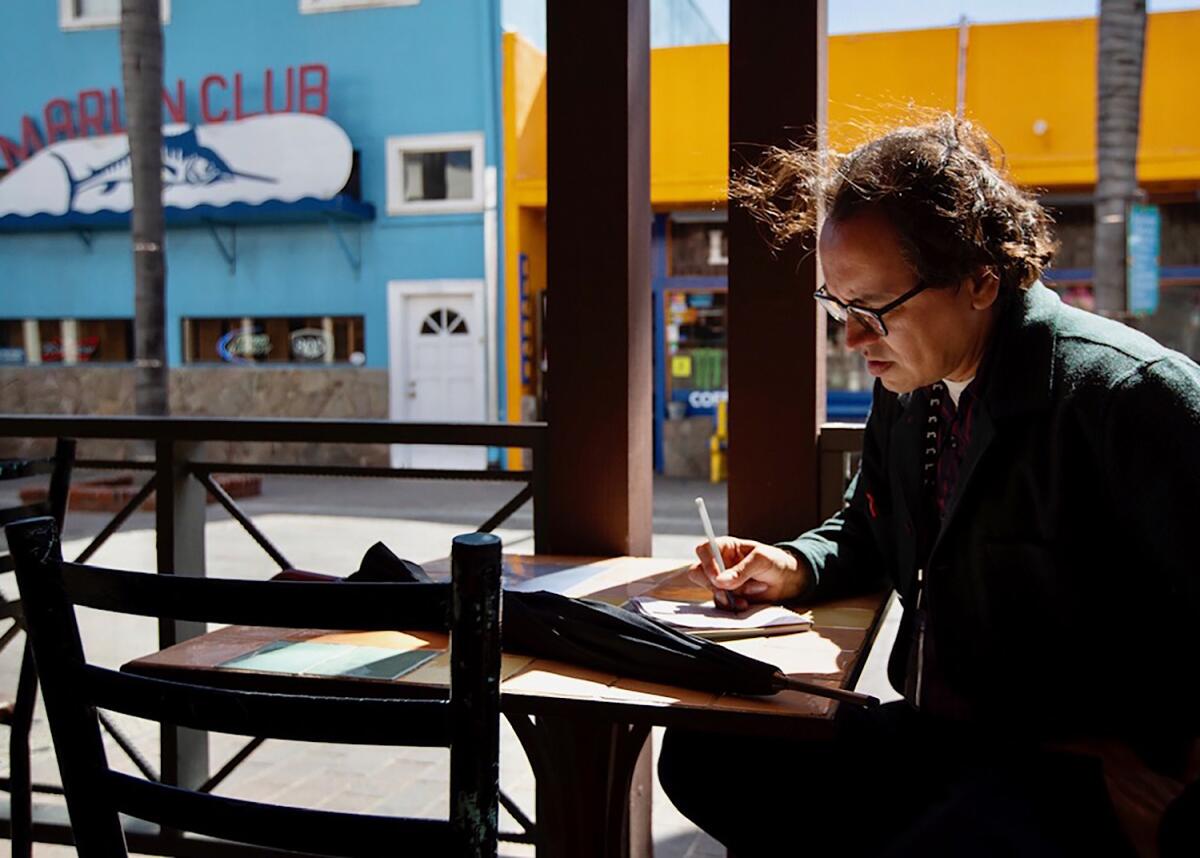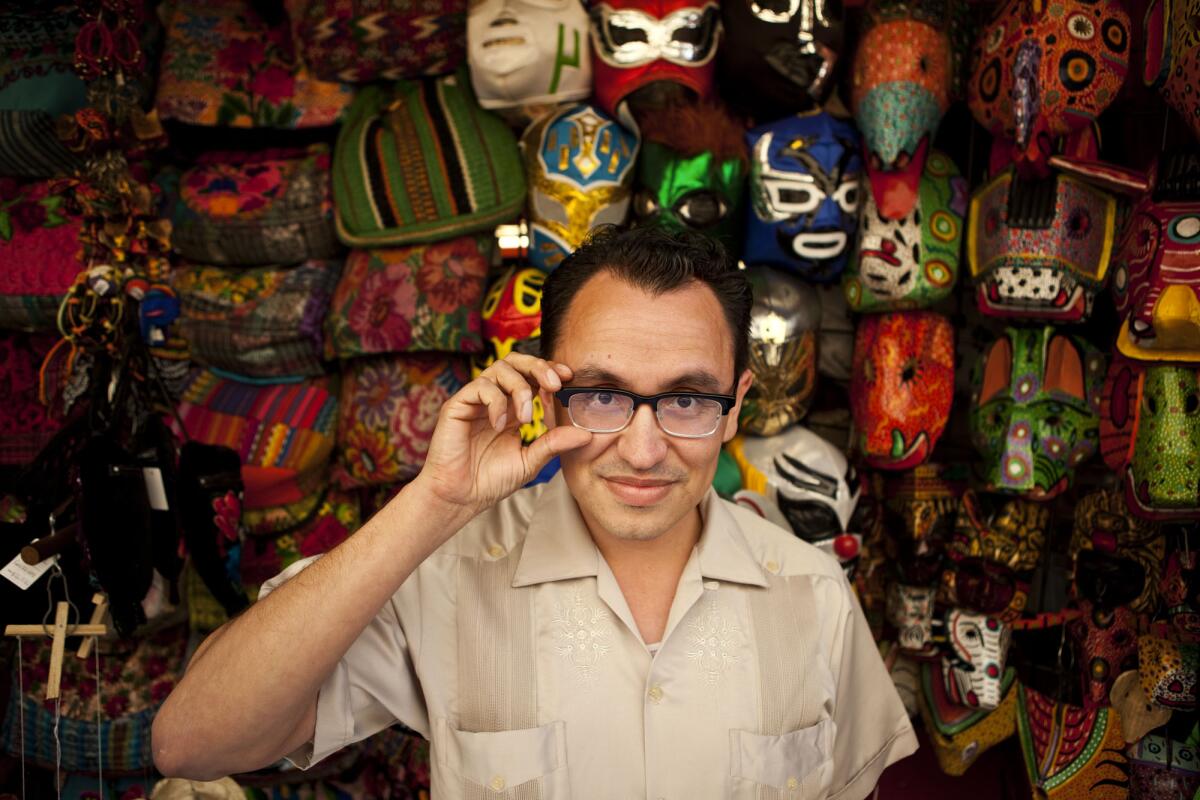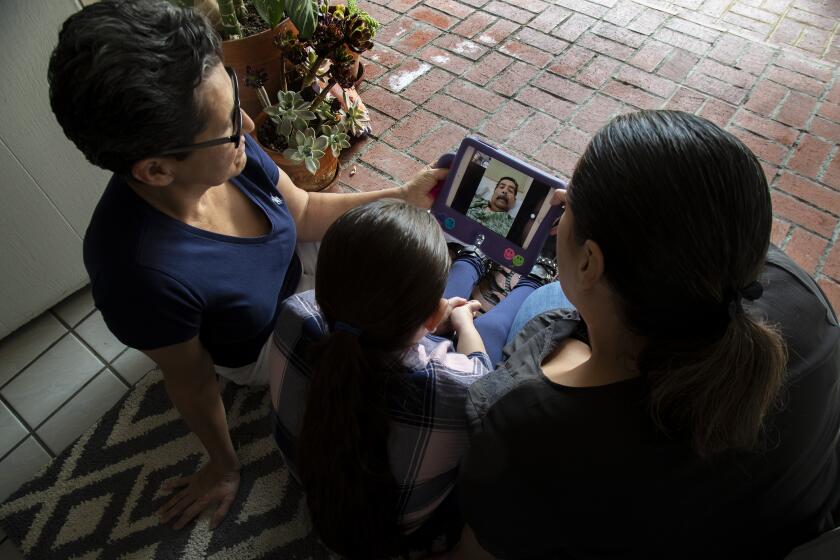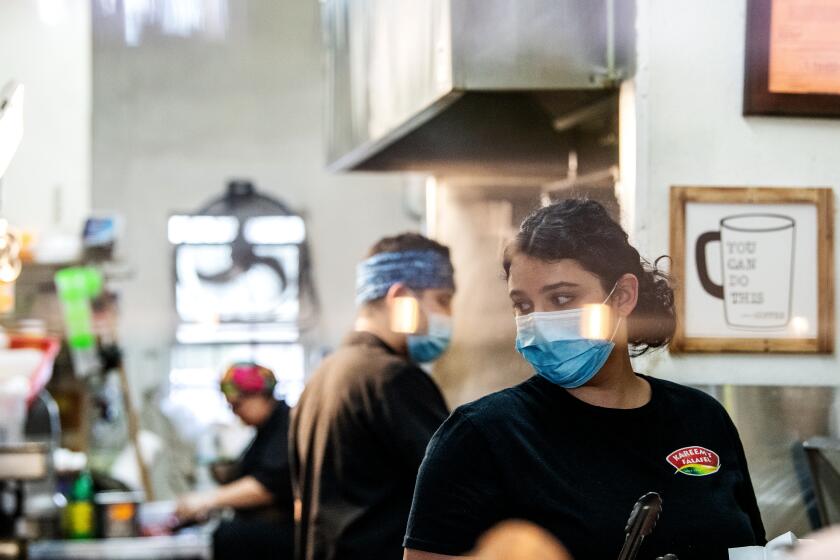Column: Wherever there’s a fight for California’s future, this Mexican nerd will be there

- Share via
I snaked my Yukon past funerals and tombstones at Pacific View Memorial Park in Corona del Mar. At its summit was my destination: the Alcove of Time.
There, in a small mausoleum niche on the bottom row of a wall full of them, were the cremains of pioneering Los Angeles Times reporter Ruben Salazar.
On Aug. 29, 1970, he covered the Chicano Moratorium, an anti-Vietnam War rally in East Los Angeles. Lawmen broke up what had been a peaceful afternoon with clubs and bullets; protesters responded with soda bottles and fists.
Salazar ducked into the Silver Dollar Cafe to wait out the chaos with a beer. Instead, a sheriff’s deputy shot a tear-gas canister into the bar that hit the reporter’s head, killing him instantly.
Memorials soon sprung up for Salazar, whose reporting on Southern California’s Mexican American community gave voice to the voiceless and launched a new journalism genre.
But there is no hint of this legacy at Salazar’s final resting place.
A cast-iron plaque decorated with an hourglass and olive branches reads “Rubén Salazar Beloved Husband and Father” and lists the date of his birth and death. That’s it. There is no nook to leave flowers or mementos or anything.
So I came with a gift: a bottle of Manzanilla wine.
Salazar was a bon vivant who enjoyed French food and good drinks, a reality far removed from the martyrdom fans have affixed on him. He was a man who defied expectations, even as his heart was always with los olvidados — the forgotten ones — of society.
I came to ask for a blessing. Earlier that day, The Times announced I would be its latest Latino news columnist — the first in nearly eight years, and only the sixth in its 139-year history.
This, in a city where we’re nearly the majority. In a state where we’re already the plurality.
The response was overwhelmingly positive; the expectations, rightfully huge.
If you’re Latino in California, even if you have the luxury of a white-collar job, it’s almost a certainty that COVID-19 will stalk the life of someone you love.
“Guide me,” I asked Ruben. I offered a toast, poured a splash of the dry Spanish wine on the floor directly in front of his niche, and then took a swig myself.
A sea breeze cut through the muggy morning air as I headed back to my Yukon. Then I remembered my good manners.
I returned to Ruben’s niche, wiped down the puddle of Manzanilla in front of him, and went off to work.
**
So, um, yeah. No pressure.
Hola! I’m your latest Los Angeles Times Latino columnist.

For nearly 13 years, I wrote a column called ¡Ask a Mexican!, where I mocked the very idea of a “Latino columnist.” You know: those well-meaning scribes who try to convince white readers that if they just talked to Latinos, everything would be chido (Mexico City slang for “copacetic”).
I felt such pundits were antiquated and too apologetic. Because I never thought of myself as a minority who needed to be understood.
Because I knew who I was.
Throughout my 20-year journalism career, I’ve navigated a gantlet of editors and readers who tried to pigeonhole and tokenize me as they had too many Latino reporters past and present.
Instead, I tokenized myself.
I wrote about Latinos, yes, but in a way that centered us as the norm instead of some exotic interloper in the Southern California story.
And I also wrote about other things.
Because that’s who I am.
I’m the Southern California-born son of immigrants from the state of Zacatecas, the Iowa of Mexico. One picked garlic in Gilroy as a 9-year-old; the other came to this country in the trunk of a Chevy.
They raised a nerdy son who spoke Spanish when he entered kindergarten and is now the black sheep in a family of public-sector siblings — because I decided to become a writer.
But I’m also the schmear of Yiddish in my daily speech, a fan of Middle Eastern food and Cambodian acid rock, and all the other parts of Southern Californian culture that make our collective identity as deliciously jumbled as the chili cheese fries at Tommy’s.
That’s what I plan to bring to this column.
I want to show who we were, are, and becoming, as Californians. And I’m the right person in this moment to tell these tales as a columnist.
Precisely because I happen to be Latino.
Trouble paying rent? Keeping your hard-fought gains? With a fear that the good times can quickly end that now sways over your days like palm trees?
Welcome to the life that Latinos have been living in California since 1848.
But the flip side of that fatalism is resilience. Pluck. Mañana as a promise, not an excuse.
And a willingness to fight for lo bueno — the good.
It’s a battle plan that has guided and sustained Latinos in California for over 170 years.
So it’s about high time everyone else listens to us.
But not me.
You shouldn’t care about what I’ll tell you; you should care about what I’ll show ustedes (that’s “y’all” in Spanish).
So instead of pontificating from behind a desk, I’ll be where the action is. At strawberry fields and downtown protests, classrooms and tejuino stands. In East Los Angeles, Riverside, Orange County and beyond. I’ll talk to people whom I want to champion, people with whom I’ll agree to disagree, and people who deserve an FBI investigation.
The ongoing COVID-19 pandemic and ensuing shutdown have left many restaurants uncertain about their future.
I want to do a bit of everything in this column, which will appear about once a week — sometimes more, sometimes less. Expect triumphs and tragedies. Long pieces. Profiles. Investigations. History. Politics. The economy. Even the occasional food review.
And I’ll write with expectations.
But only mine.
To try and write as the voice for a particular group of people is a guaranteed failure and presumptuous. The world doesn’t need another self-appointed savior.
To write as a voice gives you a shot to help those you truly care for.
So I write as myself.
A zacatecano.
A nerd.
A columnist. A reporter, always.
A Southern Californian, reporting for duty.
Think of me as a Mexican Tom Joad: Wherever there’s a fight for our future, I’ll be there — wearing a mask and socially distant for a while, of course.
More to Read
Sign up for Essential California
The most important California stories and recommendations in your inbox every morning.
You may occasionally receive promotional content from the Los Angeles Times.














